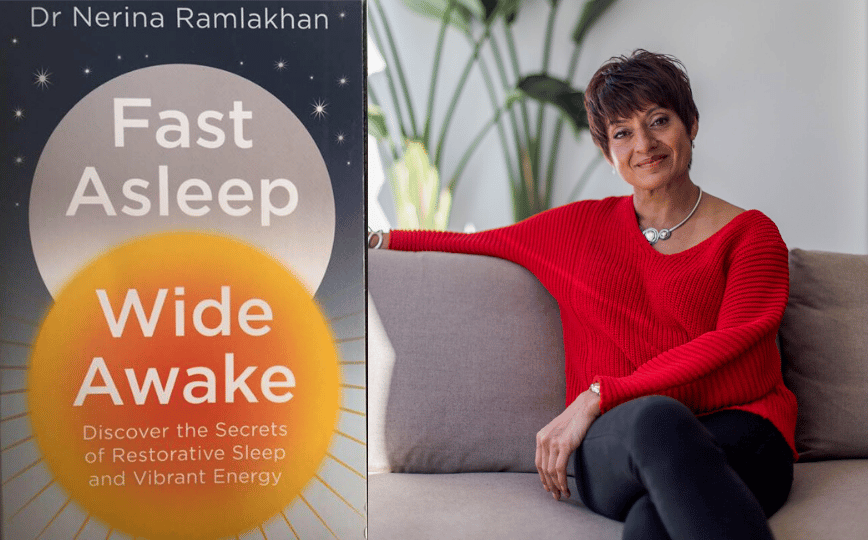If you can't sleep or you're struggling to get good quality sleep, you're not alone!
Dr Nerina Ramlakhan is a neuroscientist and sleep expert. She has written 3 best selling books on the subject.
I caught up with her to ask her about her own story and to share her toolkit for a good night's sleep.
You can watch the video below or listen to the podcast;
Why are you so passionate about sleep, Nerina?
“I guess I know what it feels like to not sleep well. I didn't realize I had a problem until I got very ill. When I was in my early thirties. I thought that the way I slept was the way everyone slept. And now that I've learned how to sleep well, I have been able to access the healing that that brings.
And I am a 56 year old woman. I'm going through my menopause. And most of the time, I sleep really well. A bad nights sleep doesn't set me back. I've learned how to cope with bad sleep. But I also know that when we sleep pretty well, it heals the body on so many levels.
There's a reason why nature has given us this amazing capacity to heal when we sleep at night. We're designed to spend a third of our life sleeping. And there's an intelligence in that. So I want that for everyone. And I think we especially need it at the moment.”
If we knew more about the health benefits of it, do you think we would pay a bit more attention to how we sleep?
“There was a time when I would have just said yes, of course. But I actually genuinely don't know no anymore. Because I think people still underestimate the process of sleep and the value it brings. And we still can get so caught up with other things that get in the way and the challenges of life.
And I know that a lot of women are going through the menopause. It's such a sensitive time of life. We might have elderly parents, young children and we have all of these demands. And those of us who are trying to forge ahead with our careers as well. So with all of these pressures, often sleep is the thing that gets squeezed out even against our best judgment.
We've never been more well set up to get a good night's sleep. You look at how much thought we put into our beds, our mattresses, our pillows, our Neom candles, our aromatherapy oils, our vitamin supplements. There's a whole industry supporting us, trying to get a good night's sleep.
We've come a long way since the hunter gatherer days, sleeping on a mat of leaves. And yet we fail to truly cultivate a deeper relationship with ourselves in such a way that's going to give us a good night's sleep. And that's what it's about. I don't think it's about us not really recognizing that we need a good night's sleep. I think we know that. But I think we're missing the bit in between, which is that no amount of Egyptian thread count, Neom candles, aromatherapy (trust me, I've got the whole lot in my bedroom). But no amount of that is going to touch the sides unless we start to cultivate a different relationship with ourselves.
Because fundamentally the way we sleep is a reflection of how we live and the choices we're making from the minute we wake up until the time we get into bed at night. Every choice we make in those 1,440 minutes, every choice we make lands in the nervous system, it's a summation of choices that sit in the nervous system – in such a way that it creates safety or not safety when we get into bed. And it's almost an algebraic equation. Have we made enough choices that have led us to safety or have, has the unsafety equation won the day.”
So what are some of the bad choices we're making or some of the choices that will impact our sleep?
“Let's start simple. I mean, the obvious thing is if you're drinking 15 cups of coffee a day is probably going to affect the quality of your sleep. It's also how we eat, what we drink, how we move, whether we move, the way we breathe.
The self care angle is so important, but if you're not looking after yourself or you've got these outside pressures, it can physically affect the way you sleep.”
What are your 5 top tips for a good night's sleep?
- Stabilise your blood sugar levels when you wake up in the morning by eating something small if you're waking up with anxiety and fear. Even if it's just some almonds or a couple of dates. Or half a banana and some protein.
- Don't use caffeine as a substitute for food, especially if if you're waking up with anxiety.
- Drink water. Keep your hydration levels up.
- Cultivate a healthy relationship with technology, rethink the technology in the bedroom. Don't look at your clock when you wake up during the night. Have your phone switched off and charging in another room.
- Try and get to bed earlier. Our sleep biochemistry, our sleep neuroscience is set up for a perfect cascade of interactions around 9:30 – 10pm. So it means that it's easier to catch that wave and surf into deep sleep. You don't have to be fast asleep, read a book, write a gratitude journal, meditate, but do something that enables you to let go of the day and surf a biochemical neurophysiological wave into deep sleep.”
Find out more about Dr Nerina at www.drnerina.com
And if you'd like help with your diet, lifestyle, supplements or testing, contact us for a free discovery call to see if we can help.

